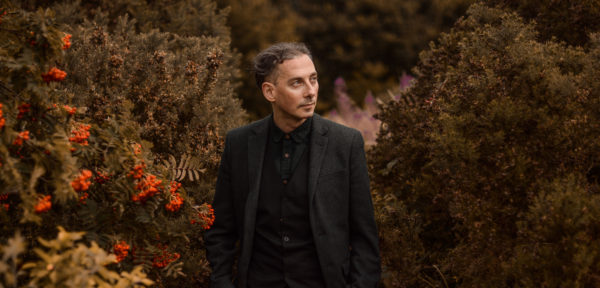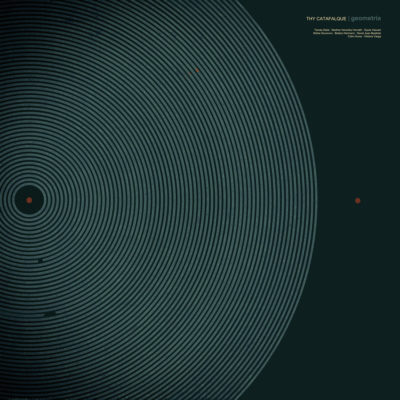Entrevue avec Tamás Kátai: le génie derrière Thy Catafalque Entrevue

Crédit photo: Aurelija Karaliunaite
Fort d’une série d’albums encensés par la critique et les fans, Thy Catafalque, alias de Tamás Kátai, nous a offert le 4 mai passé son huitième album intitulé Geometria. Nous discutons avec lui de cette récente sortie ainsi que de sa démarche unique en tant que créateur.
**Cette entrevue a été réalisée en anglais et elle est publiée dans son intégralité sans traduction. Ainsi, nous évitons tout effet de lost in translation.**
Q : First, could you present your new album under the Thy Catafalque moniker; Geometria?
Tamás Kátai: Hello. Well, this is the new album, the eighth in a row and this is where we are today.
Q : Can you tell us more about the musicians that contributed on this record and what was your highlight about their presence?
T: Yes. First of all let me introduce Martina Horváth on vocals. She is the vocalist of her own band Nulah. She is just a lovely creature with not only great voice but a very creative mind, bringing a lot of life to the album. My favourite moment of her singing might be the vocals of Tenger, Tenger because it has a very personal touch. Gyula Vasvári from Perihelion is also here, he had been singing on Meta as well and again, he is singing in two songs, greatly. Misha Doumnov on violin in three tracks. Balázs Hermann from my old band, Gire is here with a fretless bass solo, David Jean-Baptiste with a saxophone solo and Colin Hume on trumpet. And also, Viktória Varga is back again delivering some narration in Hajnali Csillag.
Q : There are many instruments that are not common to Metal in general, I know you stated that Geometria is Metal but it is one of the many elements. The insertion of a saxophone, a trumpet, violins and other instruments gives a depth that is very experimental and gets you close to jazz. Do you think there’s a limit to experimentation? Could it be the fans willing to follow or your will to take it even further every time?
 T: I’m just doing what I feel right and it’s amazing if listeners can follow my way. Thy Catafalque is still based on metal I would say, but I don’t think metal is superior to any other genres and I love to be free to try anything I think about without feeling discouraged by stylistical rules. My main motivation however is creating songs and music not for the sake of experimentalism but for the songs themselves, so I rather not cram all my ideas into each song.
T: I’m just doing what I feel right and it’s amazing if listeners can follow my way. Thy Catafalque is still based on metal I would say, but I don’t think metal is superior to any other genres and I love to be free to try anything I think about without feeling discouraged by stylistical rules. My main motivation however is creating songs and music not for the sake of experimentalism but for the songs themselves, so I rather not cram all my ideas into each song.
Q : What was the artistic vision of Geometria?
T: There had been not much thinking previously. I just wanted to record the next album with noticeably better production because that was something that had always been a pain for me. My albums never really sounded good. This time I invested in a new computer and audio interface and started recording from scratch with new software and slightly different approach. So technically there was a definitive difference. Artistically speaking my only goal was not to repeat myself if it was possible.
Q : Since its release, I’ve listened to Geometria more than a dozen times and what stood out the most for me is how the album seems to have a dual personality à la Dr. Jekyll and Mr. Hyde. Meaning that there are some aggressive songs and other really smooth moments. How did you choose the pacing and the order of the songs on this release?
T: Pacing is an interesting thing. Take Szamojéd Freskó és Töltés. Those two song follow each other seamlessly, exactly the same tempo and melody with extremely different orchestration, so the first one is a massive metal song, the second however is more like electronica with sci-fi vibes. Same parallel with Gőte and Sárember. Their tempo is the same, whereas the music and atmosphere are totally different. Anyway I don’t think I have many aggressive songs, none on this album and probably one or two on Sgúrr. These tracks are heavy and dark when it comes to metal but not really aggressive. Hate is not involved here, it just doesn’t come out of me naturally and I don’t feel the urge to force it. So to answer your question I myself don’t see these songs so far from each other. Surely the atmosphere is changing from song to song but not in Hyde-Jekyll way, more like how the seasons change.
Q : You seem to always reinvent yourself to make music and never take the same path as an artist, is it a constant challenge for you?
T: It is indeed. I am not a good player and my abilities are limited, hence I have my boundaries in self-expression and it’s not easy to avoid repeating the formulas. That is one reason I like to involve guest musicians – they give me inspiration and lend fresh air in the music.
[bandcamp width=350 height=470 album=3014407125 size=large bgcol=ffffff linkcol=0687f5 tracklist=false]
Q : I wonder if you are reading or not the reviews about your works but how do you receive negative and positive feedbacks from it? How do you deal with it?
T: Surely I read reviews. Feedback is important even if I walk my own path. There is a balance and if you manage to handle feedback properly you can filter out the useful bits and ignore unimportant or exaggerating details. Exciting reviews can even inspire me or show me a point of view I have never thought about and it’s pretty interesting. I appreciate people’s opinion whatever it is, negative reviews don’t piss me off at all. Unfair ones can but unfairness in general is something I can hardly take easily.
Q : How has been the response to Geometria so far?
T: I think pretty good. I have this regular summary from Season of Mist on reviews and it’s 84% after plenty of reviews so far. That’s not bad. Some fans are clearly disappointed because of the lack of metal in Geometria and I feel for them, yes, it’s not that metal, true. I’m not sorry about that though, that’s all the metal I have in myself at the moment.
Q : You are very prolific, with Meta released in 2016,Sgùrr in 2015 and now Geometria, is it because with time and experience writing and composing has become a process that comes more and more efficient and you know how to express your vision and translate it more fluently in your music?
T: Mostly because I had enough time in the last 2-3 years for making music, but I can tell you, it’s over for a while. There are huge changes in my life and right now I have absolutely no idea when any new stuff will be written, let alone recorded.
Q : The artwork is neat and, just like the music, it is a complete departure fromMeta. How did you came up with the title and artwork for Geometria?
T: Thank you. I chose this title because there are some geometrical motifs in some of the songs (plane, pyramid, cone, circle) but the theme of the tracks is not geometry itself. These are symbolic elements here. As usually most the lyrics deal with cycles of life and nature, memories from my home town, childhood, stars, autumn, vanishing into dark, and summer corn fields. The artwork reflects the title and can be read symbolically. The two tiny red dots in the immense space separated or two atoms in the microscopic level.
Q : Since I know you are always looking towards the future, what is coming up for Támas Kátai?
T: I try to live a useful and happy life, this is my goal.
Q: Thank you very much for taking the time to answer our questions! I wish you all the best!
T: Thanks very much for asking me and liking my stuff. It’s very much appreciated. All the best for you!
Auteur: Michaël Parent

